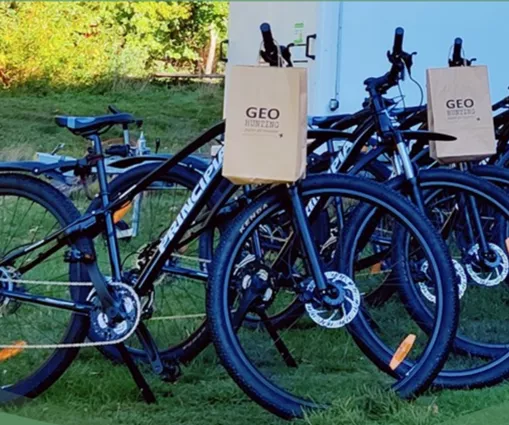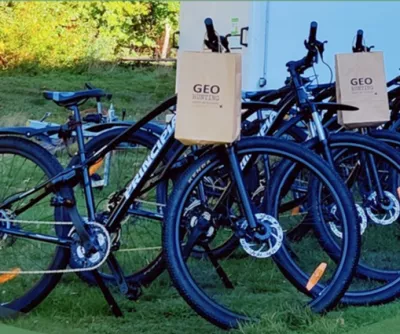Summary
The initiative Op på Cyklen! (‘Get on the Bike!’) was started by students from rural elementary schools in Denmark, aiming to shift their education away from conventional indoor classrooms to outdoor settings. Facilitated by the Midt-Nordvestsjælland Local Action Group (LAG), the project served as a pilot study to explore how small, traditional rural towns in Denmark could be made more engaging and conducive for young people through schemes led by the students themselves.
The focus was on integrating physical activity and outdoor experiences into the learning process. There has been significant interest from several classes to transform the experience into an excursion with an overnight stay in nature. To accommodate this, the project successfully established a shelter.
Results
The initiative procured 30 bicycles, a significant move aimed at facilitating the project's objectives. These bicycles were offered free of charge to individuals within the project's target group, accompanied by bicycle helmets and safety vests. This approach ensured that everyone had equal access, levelling the playing field for all participants.
A key element of the project was the provision of three distinct experiences for participants to choose from. Each experience offered various distances and starting points, blending educational tasks, collaborative problem-solving and physical activities. Ranging from approximately 5 km to a challenging 15 km, these experiences provided diverse opportunities for learning and engagement.
Additionally, the project ambitiously included the construction of a shelter to accommodate an entire class of 20-30 children. Strategically situated in the area of the longest experience, this shelter became a crucial component, enhancing the overall learning and adventure aspect of the initiative.
Resources
Documents
Context
Get on the Bike! was a small-scale project that sought to create engaging experiences in smaller Danish villages faced with stagnating development or a decline in population. Often, this demographic issue arises due to a lack of educational and recreational activities for children and young people, leading some families to relocate to urban areas. To tackle this challenge, the project focused on the younger demographic, primarily targeting students from 5th to 9th grade, aiming to bring them closer to nature for experiential learning. It used a methodology centred around three adventure hunts, providing an opportunity for participants to immerse themselves in the charm and rich cultural history of rural areas. These adventure hunts consisted of treasure search trials, fostering interaction among young people, exploration of nature, discovery of the local surroundings, and engagement in sports and recreational activities. To support implementation of the project, logistical aspects and the necessary equipment such as bicycles, trailers and bags for the hunts were provided. Additionally, the project involved adaptation of the methodology and the design of the hunts and trials.
Objectives
To empower young students in rural areas to create and execute their own projects, actualising their unique ideas according to their specific needs and aspirations for the future of their local rural community.
Activities, key actors, and timeline
The first task for the LAG was to explore whether the project's concept could address more than just the need to move beyond the traditional classroom setting. It quickly discovered that the project addressed broader themes, including:
-
Examining the methods and approaches to learning and teaching within Danish public schools;
-
Encouraging a sense of pride in the local area and its natural surroundings; and
-
Highlighting the necessity for enhanced social connections beyond the school environment.
An unexpected outcome was the revelation that a significant number of children in rural Danish areas felt uncomfortable cycling. Many didn't own bicycles or hadn't learned to ride at all. This was attributed to several factors: 1) Parents considered cycling unsafe due to inadequate road safety measures and opted to drive their children to school; and 2) Children in smaller rural towns lacked the same road safety training found in larger urban areas. Moreover, it was observed that the availability of bikes was crucial to many children, ensuring equal access and mitigating social disparities.
Success factors/Lessons learnt
This non-profit project yielded invaluable lessons on activating young minds and instilling a sense of ownership and responsibility for rural landscapes. Through the LAG’s support, young individuals were empowered to contribute ideas aimed at enhancing the allure of rural areas. This support fostered innovative thinking among the young people, essential for stimulating novel approaches in Danish rural districts. By nurturing the project ideas of young residents in these rural areas, the initiative not only empowered them but also underscored their relevance in the development of their surroundings. This recognition significantly increased the likelihood of these young individuals considering resettlement in rural districts as they matured – an inclination expressed when questioned by the LAG. Moreover, the project aligned with three of the UN's Sustainable Development Goals. Firstly, it contributed to the 3rd goal by promoting physical exercise, human collaboration and community building. Secondly, it addressed the 11th goal by emphasising sustainable energy, transportation and life in small towns and villages. Lastly, the project's adventure hunts facilitated an exploration of rural landscapes, contributing to the 15th goal, centred on life on land and the preservation of cultural heritage.
Contacts
Michella Schack, kontakt@projektplaneten.dk

